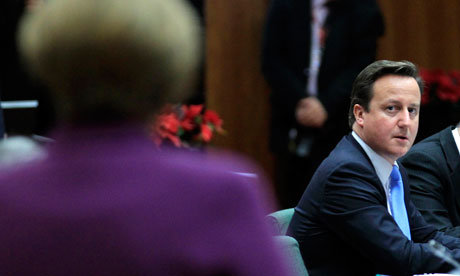Western politicians are dire, but we mustn't despise government
Our leaderships, in thrall to big business, are failing in so many places all at the same time. But we can't give up on them

David Cameron was quite right to reject
an economic treaty wasn't even written yet, much less scrutinised.
Photograph: Yves Herman/Reuters
The year 2011 will be remembered as the year of failed summits. Governments proved themselves time and again to be failures at addressing the growing crises engulfing the world, whether the eurozone debacle, climate change, or budget politics in the US and Europe. Next year is likely to be worse, as electoral politics will further impede decision-making in the US, France and several other countries.
Why should governance be so poor in so many places at the same time? There are several factors at play. Globalisation has undermined the manufacturing base of most of the high-income economies, costing millions of jobs and leading to stagnant or falling living standards for a large part of the workforce, especially those with basic skills and modest education attainment. The US has lost around 8-9 million manufacturing jobs since the peak in that sector in 1979, just as China was joining the world economy. Meanwhile, the soaring economies of Asia have pushed up world food and oil prices, further squeezing real incomes in Europe and the US.
Yet in the face of high unemployment, growing inequality and looming budget deficits, most governments are paralysed, in thrall to powerful interests. Wall Street, the City of London, the Frankfurt banks and other corporate lobbies hold politics in their grip, and block effective change. Top income tax rates are kept low; banks remain undercapitalised and under-regulated; and urgently needed public investments for education, job skills and upgraded infrastructure are being slashed in response to budgetary pressures.
The politicians are also in way over their heads. They are typically negotiators and public relations specialists, not experts on the policies needed to resolve the world economy's crises. The special interest groups write the scripts, but these scripts prove impossible to stage. Every European summit in the past two years has not only failed politically, but also technically. The policy prescriptions put forward by Germany's Chancellor Merkel are poorly prepared and designed, and impossible to implement. The euro is being killed not only by politics but also by incompetence.
The actual process of governing has descended to soundbites. In the US the Obama administration has failed to produce a major policy document on any area of key policy concern: the budget, taxation, energy, climate, financial regulation, healthcare or poverty. Policies and legislation are decided in the backrooms dominated by lobbyists and negotiators. Politics is by horse-trading among interest groups – not by reason, expertise and democratic deliberation.
The European Union processes are now equally bizarre. The entire union of 27 countries awaits the word of one member, Germany, whose policy logic in turn reflects a mix of post-traumatic stress, coalition politics, powerful yet crippled banks, and amateur politicians. The European commission seems to play little or no role. Major new treaties of constitutional importance are launched by Germany days before a summit, with no reasoned discussion or professional analysis. David Cameron was absolutely right not to be cowed into signing up to an economic treaty that isn't even written yet, much less professionally scrutinised.
A few countries, notably the northern European social democracies, are keeping their heads above water, at least for now. They are stable because income inequality and poverty are kept low by active government policies. Transfer payments to the poor and the social safety net are robust. Tax collections are ample and budgets are in balance or surplus. Even these countries flirted with financial deregulation in the 1990s, paid a heavy price and then got their banking sectors back under control. Tough financial regulation has served them well during the past decade.
So what can we learn from the few success stories? First, societies function properly only when they are judged by their citizens to be reasonably fair. Northern Europe has built its policies on a framework of equality and inclusion. In the US, the idea of fairness has been almost absent from political vocabulary for three decades. The Occupy Wall Street movement, thankfully, has brought it back to life. Most of Europe is somewhere between the fairness of northern Europe's social democracies and the glaring inequities of the US. Yet in much of western Europe there has been a clear shift away from solidarity, towards harsher policies that shield the rich from their responsibilities to the rest of society.
Second, economic success requires increased public investments in education, infrastructure, energy, job skills and more. Simplistic budget cutting will destroy governments rather than fix them. Higher taxes on top incomes and wealth must be part of any sound fiscal strategy. Yet till today, Washington politicians of both parties have been recklessly and thoughtlessly squandering American prosperity by prioritising tax breaks for the rich.
Third, more expert policymaking is needed. The eurozone crisis, for example, requires urgent attention to Europe's decapitalised banks. Yet German politicians, driven by ideology and local politics, have been fixated on fiscal problems while allowing the banking crisis to fester and worsen. The US crisis is fundamentally about the under-taxation of the rich, yet the policy focus remains on budget cutting. In both Europe and the US, political debates consistently miss the mark by short-changing serious diagnostics and policy design.
Our temptation in the face of rampant government failures is to despise government, and even to cheer its demise. How can we avoid that feeling when we watch politicians preening on the TV screen? Yet we desperately need to make the US and European governments work again – not for the politicians' sake, but for ours. Unless we restore skill, fairness, and vibrancy to our democratic institutions, the unrest on the streets is bound to grow.

No comments:
Post a Comment